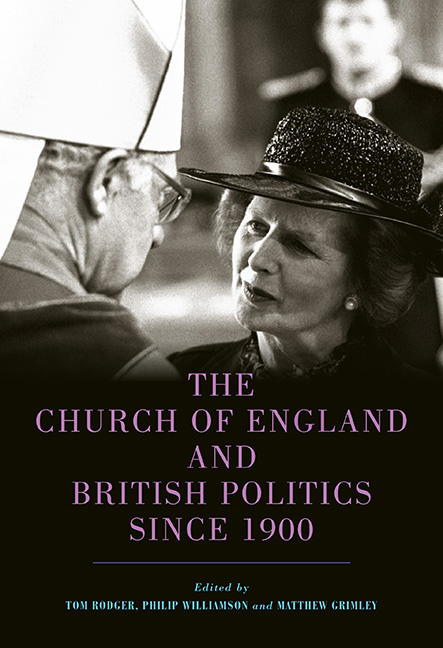Book contents
- Frontmatter
- Contents
- Notes on contributors
- Preface
- Abbreviations and locations of principal collections
- Introduction: the Church of England, the British state and British politics during the twentieth century
- 1 The politics of Church defence: Archbishop Davidson, the national church and the ‘national interest’, c. 1900–14
- 2 Archbishops and the monarchy: leadership in British religion, 1900–2012
- 3 Ecclesiastical conservatism: Hensley Henson and Lord Hugh Cecil on Church, state and nation, c. 1900–40
- 4 Hensley Henson, the prayer book controversy and the conservative case for disestablishment
- 5 Assembling an Anglican view of self-governing sexual citizenship, 1918–45
- 6 Politics in the parish: Joseph Needham at Thaxted, c. 1925–85
- 7 Anglicans, reconstruction and democracy: the Cripps circle, 1939–52
- 8 Parliament and the law of the Church of England, 1943–74
- 9 The Church of England and religious education during the twentieth century 199
- 10 Spiritual authority in a ‘secular age’: the Lords Spiritual, c. 1950–80
- 11 ‘A sort of official duty to reconcile’: Archbishop Fisher, the Church of England and the politics of British decolonization in East and Central Africa
- 12 A ‘baffling task’: Archbishop Fisher and the Suez Crisis
- 13 John Collins, Martin Luther King, Jr, and transnational networks of protest and resistance in the Church of England during the 1960s
- 14 The Church of England, minority religions and the making of communal pluralism
- Index
- STUDIES IN MODERN BRITISH RELIGIOUS HISTORY
Preface
Published online by Cambridge University Press: 28 April 2020
- Frontmatter
- Contents
- Notes on contributors
- Preface
- Abbreviations and locations of principal collections
- Introduction: the Church of England, the British state and British politics during the twentieth century
- 1 The politics of Church defence: Archbishop Davidson, the national church and the ‘national interest’, c. 1900–14
- 2 Archbishops and the monarchy: leadership in British religion, 1900–2012
- 3 Ecclesiastical conservatism: Hensley Henson and Lord Hugh Cecil on Church, state and nation, c. 1900–40
- 4 Hensley Henson, the prayer book controversy and the conservative case for disestablishment
- 5 Assembling an Anglican view of self-governing sexual citizenship, 1918–45
- 6 Politics in the parish: Joseph Needham at Thaxted, c. 1925–85
- 7 Anglicans, reconstruction and democracy: the Cripps circle, 1939–52
- 8 Parliament and the law of the Church of England, 1943–74
- 9 The Church of England and religious education during the twentieth century 199
- 10 Spiritual authority in a ‘secular age’: the Lords Spiritual, c. 1950–80
- 11 ‘A sort of official duty to reconcile’: Archbishop Fisher, the Church of England and the politics of British decolonization in East and Central Africa
- 12 A ‘baffling task’: Archbishop Fisher and the Suez Crisis
- 13 John Collins, Martin Luther King, Jr, and transnational networks of protest and resistance in the Church of England during the 1960s
- 14 The Church of England, minority religions and the making of communal pluralism
- Index
- STUDIES IN MODERN BRITISH RELIGIOUS HISTORY
Summary
The Church of England's place in British politics has rarely in recent times commanded such popular attention and consideration. The politics of economic austerity have attracted sustained criticism from senior Anglican clergy of government policies of a kind unseen since the mid-1980s. Debates over the ordination of women, the appointment of women as bishops and legislation on same-sex marriage have re-emphasized and re-politicized the privileges of the religious establishment. The advance of political devolution and the approach of a new coronation have also raised questions about the relevance of the ‘traditional’ Church establishment in a modern multicultural society.
Not without cause, then, academic interest in the established Church’s influence in British politics during the twentieth century has been growing. There have been studies of, among others, the enduring influence of Christian political thought, the archbishop of Canterbury's institutional political functions, the Church's practical role in decolonization and – most prolifically – its influence on the various ‘permissive’ initiatives of the 1960s.
As this list suggests, the historical literature on the Church, the state and politics during the century has so far been characterized largely by tightly focused studies of particular themes and incidents. More work of this nature is certainly needed, but there is now also a need to draw the literature together, developing understanding of the connections between the more specific studies.
This volume originated in a day conference in 2015 on ‘The Church of England and British politics since 1900’, which I organized at Hatfield College, Durham University. Its purpose was to gather diverse perspectives on the Church's political role and consider the scope of the developing field of enquiry. The papers and the discussions at the conference suggested the potential for a collection of essays, and I am grateful that so many colleagues have shared these aims and been keen to contribute. The result is a volume that indicates the different ways in which the Church of England influenced ‘British politics’ in the broadest sense and how it retained and renewed its significance in British public life despite the growth of a more secularized, multi-faith and individualized society.
The editors thank the Faculty of Arts and Humanities and the Department of History at Durham University, which funded and supported the 2015 conference and have assisted the publication of this volume.
- Type
- Chapter
- Information
- The Church of England and British Politics since 1900 , pp. xi - xiiPublisher: Boydell & BrewerPrint publication year: 2020

